#Music taxonomy
Explore tagged Tumblr posts
Text
I would classify the Borderlands piece as "world music" (that's the actual name of that genre).
I would classify the Potemayo piece as "blues-themed" music, i.e. a composite of music tropes that sounds reminiscent of the blues in its color and harmony but isn't actually musical or melodic in the way that blues music usually is. This style is commonly used in film and game soundtracks to give a "down-home, country-style" feeling to something without lasting too long or getting in the way of the action or dialogue.
The last piece is hard to place. It sounds like a fusion of several different musical genre ideas, almost to the point of being a pastiche. It doesn't really strike me as "musical"; more like a "soundscape." The clipping (from making it artificially too loud) is real bad; I found this hard to listen to. I don't have a strong guess to venture as to its best-fit categorical label.
what is this genre of music called?
youtube
youtube
youtube
31 notes
·
View notes
Text
i do think it's extremely funny that one of my three jobs is Mushroom Librarian. like yeah i work on a farm and at a restaurant in town and in the Fungus Archives
#my posts#and it's awesome. i'm doing a full taxonomy update of the college's collection this term#which means i get to spend hours updating the database and relabeling boxes while listening to music or podcasts or whatever#it's extremely chill and i get a nice view of the ocean too
24 notes
·
View notes
Note
For a writing prompt: maybe something with Luigi and polterpup? Or just Luigi and ghosts in general. The fact that ghosts are Real and Present in that world has always been super fascinating and a little upsetting to me haha. Could be as light or as angsty as you wish I just think Luigi being terrified of ghosts and having to (or in polterpup’s case, choosing to) be around them constantly is a fun concept to toy around with.
Apologies this took so long, anon. I vastly underestimated the demands of my travel schedule over the past few weeks. Oof. But now we're back!
Minor TWs in this one for general talk of death, existentialism, and broad references to both animal and child death (nothing graphic, nothing extreme, no on-screen death).
~~~~~~~~~~~
Of Ghosts and the Afterlife (Luigi’s Mansion 1)
Luigi didn’t like to think about death.
Not that there was much he could do about it. Death was as inevitable as a subway car with broken air conditioning on a hundred-degree day.
There was no such thing as the afterlife, Luigi having long ago abandoned the faith his brother and what remained of their family clung to, a practice more cultural than spiritual, steeped in the mores and traditions of a country and people he shared little in common with beyond his last name and an untamable mane of wavy, thick brown hair.
For Luigi, death was death - game over, end of the line, see you never. A philosophical problem he didn’t enjoy contemplating, but one he could easily shove into a forgotten closet of his subconscious, the more pressing concerns of his daily life taking up his mental energies, banal things like scraping up enough plumbing jobs to pay the rent, dealing with corroded spark plugs in the repair van, and being forced make a meal of the questionable meatball subs from the corner bodega.
Death was death. Religion was religion. And ghosts were…a fairytale, a folklore conjured to rationalize away the heavy weight of existential dread. That, or something used as a cudgel, to keep people on the side of moral righteousness, lest they be doomed to walk the earth for all eternity in the shadows of existence.
Ghosts were a thought experiment. A fun diversion in a cramped Bensonhurst studio, the heating bill long unpaid, he and his brother buried under a set of fraying blankets, their father’s hefty industrial flashlight in hand, competing to see who could scare the other the most as the D Train rattled its metal bones past their window at two in the morning.
Mario was good at stories. (Mario was good at everything). And it wasn’t that Luigi was afraid of the spirits his brother would describe in gruesome detail, the way they’d seep through cracks and keyholes, wrapping their grey, misty arms around skinny, lost children who kept too many secrets. No. He couldn’t be afraid because ghosts weren’t real.
Not until he had been unceremoniously dumped into the Mushroom Kingdom, that was.
He could deal with the existence of Boos. Well, that wasn’t entirely true, but he could at least assign them a category outside the paranormal. Boos were just another strange species, a bunch of floating marshmallows that looked like ghosts and acted like ghosts, but in no way were actual ghosts. Boos were something real, something alive, but beyond Earth’s limited taxonomies, just like everything else in this impossible world of talking mushrooms and tyrant turtles and evil wizards and booted dinosaurs and a million-and-one things that could leap out with fangs or fire or spikes and kill you at any moment -
Death, he had once nervously told his brother over a campfire on the outskirts of Toad Town, felt like it had become a way of life.
The letter had arrived on a crisp autumn morning, the early sunlight peeking through the gaps of Luigi’s drawn curtains. He remembered thinking it was a clean kind of light, unsullied by the drudgery of heavy coats and thick scarves, of greying slush and oily puddles pooling in the gutter, cigarette butts bobbing up and down like the stained buoys off Brighton Beach. Life had been, if not normal (he didn’t think he’d ever consider his existence in the Mushroom Kingdom normal), at least less chaotic than usual. There had been no invasions, no kidnappings, no pleas from neighboring kingdoms for help. For the first time in a long time, his daily routine was…pedestrian. A little boring, even. It was a nice change of pace.
He should have known better. Did know better.
No one gave away mansions.
Yeah, and I’m sure they also have a bridge in Brooklyn they’d like to sell me he had muttered, crumpling up the notice, tossing it into a dented, mushroom-shaped garbage pail without another look as he groped for a gurgling coffee pot.
Three days later, a short, wiry old man was thrusting a souped-up vacuum into his hands, blathering all kinds of nonsensical instructions about ectoplasm and strobe lights and hearts and all that Luigi could think through the high-pitched static descending on onto his brain is that my brother is in danger and holy shit this entire mansion is filled with actual, real ghosts.
There was no time to wrap his head around the metaphysics of it all, the very real danger of being killed by an entire army of irate specters overriding any considerations as to the how or why of the entire situation. Ghosts apparently existed, not only as Boos, but as colorful, globulous forms, as cantankerous old knitting women, as mechanical, murderous toy soldiers, and worst of all, as small children and even screaming babies, the terrible implications of which rattled around Luigi’s already frenzied consciousness as he sucked the heart from a wailing infant, in all likelihood murdering it a second time. (A hazy memory had surfaced, a small, doll-like figure laid on a cheap, linoleum kitchen table, legs unstable as a small cadre of extended relatives wept and laid kisses on the child’s forehead. Forty and eight hour, their great-grandmother had commanded in broken English. To be sure the true dead. Spirito.)
It had been less than twenty-four hours, he reminded himself. Mario wasn’t dead. Or undead. Or whatever. Not according to tradition, and certainly not according to Luigi’s empirical observations (which seemed to be holding less and less weight as the paranormal evening drew on). No, he had seen his brother through the marble fangs of the dragon’s head. He was in the painting, banging for his life against an invisible prison of oils and canvas, his mouth open in a silent scream.
A victim of magic, but not a ghost.
Not if Luigi had anything to say about it.
He ran. Up broken, splintering sets of stairs; down dimly-lit corridors with threadbare rugging; through trap doors and flocks of toothy, golden bats, vacuum hose at the ready, sucking away at anything even resembling a ghost (how many curtains, how many dresses and bedsheets had he whisked into shreds all because of the ripple of a breeze or a trick of the light?)
He fought his way through chamber after chamber, slurping phantasms from earthly existence, unwilling to consider just what he’s damning his enemies to, if he’s killing them again, if they can feel pain or remorse, if this whole situation is maybe a figment of his imagination and in reality he’s back in Brooklyn, or worse, committed to a padded cell in Bellevue, colorful apparitions dancing on blank, white walls, the evidence of a broken mind.
He found his brother’s portrait hung in a baroque, gilded antechamber, the room something as alien as the specters he had been fighting, his grimy boots sinking into blood-red, lush carpeting as gems and pearls and other precious-looking stones twinkled in the light of a silver candelabra.
The keeper of Mario’s canvas prison turned to greet him, a gargantuan Boo with a jeweled crown named “King Boo” - an uninspired moniker if there ever was one - who pontificated at length, swearing vengeance on both Mario and Luigi, demanding reparations in blood and soul for crimes Luigi couldn’t even begin to understand, no less remember.
Did I kill him? Luigi had panicked, rooted to the spot, Poltergust in hand as the Boo continued his long-winded diatribe. Is that why he’s a ghost? Did Mario do something? Luigi tried not to think too hard about the ethical dilemmas of their adventures, of their roles as protectors of the Mushroom Kingdom. Sure, people got hurt, that was the nature of the beast, but…
It didn’t matter, not when King Boo conjured a several-story tall likeness of Bowser, whisking Luigi through a portal to the stark rooftop of the dilapidated mansion to engage in a twisted game of cat-and-mouse (ghost-and-plumber), the giant Koopa puppet doing its best to stomp Luigi into a fiery, broken heap of ashes.
He escaped with his life. That, and the promise of retribution from beyond the grave, King Boo spitting all forms of vile epithets and visions of eternal pain as Luigi sucked the last of his bulbous form into the squealing, smoking Poltergust.
When Mario was spat from E. Gadd’s printing machine, tumbling across the floor in a confused pile of limbs - his brother, real, corporal and definitely not dead - Luigi didn’t know whether to laugh or cry.
He never wanted to see - never wanted to think about another ghost again in his life.
Of Dogs (Luigi’s Mansion 2)
He supposed it made sense. In a way.
After all, if there were Boos, if there were ghost adults and ghost children and ghost babies - there were bound to be ghost dogs. Maybe ghost cats, as well. Hell, maybe an entire ghost civilization living (dying?) in tandem with his own flesh-and-blood world.
He hated the idea. It trampled on every tenet of thermodynamics he had carved into his brain at the age of ten, made a mockery of the physics and chemistry and engineering that had carried him through adolescence and into adult life.
The Mushroom Kingdom - that was something he had at least managed to rationalize, had begun to construct a loose schematic for, notebooks upon notebooks filled with messy diagrams and rambling equations, an inadequate translation to his Earth-bound science, but one that allowed him to find some kind of solid footing in this incomprehensible new dimension.
Ghosts did not fit into his neatly constructed template.
Least of all, ghost dogs.
Of course, the dog had to eat the key and run away, leading Luigi on a wild goose chase (he dearly hoped there was no such thing as ghost geese). He ran pellmell through gardens, through labs, through a series of mansions and other haun -
Other decidedly creepy spots in the Evershade Valley. Places where he was left to battle groups of angry, globulous…shadows. Specters. Phantoms. Spirits. Poltergeists.
Ghosts.
Again.
He would have been angry if he weren’t so terrified.
The dog, as much trouble as he was (He? She? Did it matter?) had at least not fallen under the spell of the Dark Moon, making him the Least Frightening Ghost of this particular run-in with the ethereal undead and King Boo.
And Luigi could almost get himself to…well…maybe not like him, but tolerate him. Even though the dog ate his keys, left messy trails of crumbs and soggy, half-eaten baguettes, slobbered all over Luigi’s pants, and managed at least once to urinate in a public fountain, a phenomenon Luigi would be puzzling over for months after the fact.
Best of all, the dog, unlike almost everyone else here, wasn’t bent on killing him.
He was just a normal dog.
Who happened to be a ghost.
Luigi wondered if he had had a family in life. Children to grow up with. A big house with a yard. He acted more like a puppy than an adult dog, his exuberant chaos reminiscent of the little Golden Retriever pup his second cousins had gotten when their family moved out to the Island. Oyster Bay, he remembers, real fancy stuff. Sal and Tony’s house had had trees. A garage. Separate bedrooms. He and Mario had begged for a dog for weeks after visiting, shuffling furniture around their tiny-windowed room, marking out places in purple chalk for the dog’s water bowl, his kibble, his toys.
Their father had grunted at the proposal, noting the two brothers would have to sleep in the same bed to make the space for their imaginary new pet. This ain’t no place for a dog, you two. You want animals, get a job with the pound. What, you’re still going to beg? Santa Maria. You two share that bed for a week without beating each other up and then come back to me. But I don’t like the odds. You boys haven’t shared a bed since you were seven. Five’ll get you ten you last forty-eight hours before someone’s fist is in the other one's face.
They lasted three whole days before Luigi had planted his foot in Mario’s kidneys at two in the morning.
They never saw the dog in Oyster Bay again.
A car accident, real unfortunate stuff, Aunt Maria had told them later.
The memory haunted Luigi as he unholstered the Poltergust, forcing his fingers to twist dials and push at levers. He needed that key. It wasn’t just his life on the line if he failed.
He squeezed his eyes shut as he sucked the ghost dog into the machine, trying his absolute best to ignore the little whines and terrified yips of the struggling not-animal. After what felt like an eternity, he heard the tell-tale “pop” of the Poltergust, signaling his success in capturing yet another ghost, the silver key clanging to the cobble-stoned ground.
Luigi had never felt less heroic in his life.
I just think he wanted someone to play with, E. Gadd had commented offhandedly later, emptying the Poltergust's canister into the gigantic silver ghost vault with his usual detached efficiency, oblivious to the way Luigi's features had paled at the comment.
When he got word of the dog’s escape a few hours later, Luigi didn’t even try to deny his relief.
Of Half-Lives and Vengeance (Luigi’s Mansion 3)
Fatigue. Carelessness. Hubris. Naivete.
Or maybe it had just been sheer stupidity.
An invitation to vacation at an exclusive, luxury hotel, addressed to him.
Nice things never happened to Luigi. Or if they did, he could hardly enjoy them, waiting on tenterhooks for the other boot to fall.
The boot fell that evening. It was ghosts. Of course, it was. Nearly twenty floors of ghosts. At this point, he could say he was almost used to it, the creeping shiver up his spine, the gluey residue of ectoplasm which would leave him tattooed with ugly, mottled rashes for weeks on end.
Once again, he had to act as a one-man army against the mass of spectral, malevolent will. Once again, his brother had been trapped in a painting.
There were differences, of course. Polterpup was by his side, the ethereal puppy proving more loyal to Luigi than his fellow spirits. (Luigi could never say Polterpup was "his" in the way most pet owners would lay claim to a regular cat or dog. The ghost puppy had a disturbing tendency to disappear for weeks, sometimes months on end, only to make his return in the most startling manner possible, more than once sending Luigi screaming, flailing off his bed at some weird, inconvenient hour of the night. But for as much as Polterpup could have a "home" - Luigi's house was it).
Luigi also had the help of his pseudo-clone, Gooigi, a horrifying creation of E. Gadd's, an unholy combination of ghostly discharge (the nature of which Luigi did not want to know), coffee, and, Luigi's own biological samples. An impossible being with whom he shared an inexplicable telepathic connection, and if Luigi had had any semblance of a minute to consider what that all meant (was he part ghost now? Could Gooigi outlive him? Would he maintain that consciousness after death?) he would have likely run screeching into the night.
(The fact Gooigi had proven essential to his continued existence did not distract from the wildly dubious ethics behind Gooigi's creation, an issue Luigi was definitely going to have a long talk with E. Gadd about at some point. If he could manage to broach the topic without falling into a breathless panic).
But the most striking aspect of his third encounter with King Boo and his minions, something that wriggled at the base of Luigi's cerebellum as he fought floor upon gimmicky floor the largest array of ghouls he encountered yet, was the element of premeditation.
King Boo had easily disposed of Mario, the Princess, and the Toads during their first midnight encounter. Sure, Luigi had escaped down a laundry chute, chest heaving as he toppled onto a pile of dirty towels. But that shouldn't have posed an issue for this crazed version of King Boo, a being who could literally phase through walls.
Luigi should have been dead, or worse than dead, ten times over.
No, King Boo had decided to wait. To draw out the deep, sustained hum of terror far beyond its final breath.
Security cameras were posted everywhere in the hotel. Luigi had no doubt the ghostly tyrant was following his every move, watching, salivating as he fought and struggled against Egyptian gods and malevolent Mozarts, and bearded, Bayou beasts. (Were these the literal souls of the departed? Was Mozart truly in these walls? Or was this like a ghost Halloween, a once-in-a-deathtime opportunity to fulfill that longing urge to finally be someone who you will never be?)
(He remembers being six years old. Remembers dressing as his brother for Halloween, Luigi stealing Mario's iconic red t-shirt, his parents pleading with him to go as anything else - a spider, a rat, a baseball player - Luigi refusing each entreaty. The other boys aren't going to like it, Luigi, his mother had said, consonants slurring. You're going to get the snot pounded out of you, Dad had added a beat later).
(In the end, he had thrown an old floral bedsheet over his head, not even bothering to cut out eyeholes. I'm a ghost! Luigi had boasted. You're a loser, Vinny Malanga had laughed).
And worst part of it was, Luigi knew it. Knew he could turn any corner, go down any dark hallway and be met with that signature violet gemstone, that bladed, fanged smile ready to slam an empty frame down on his head and trap him for all eternity in oil and canvas.
Death waited in every shadow.
And King Boo was going to enjoy every minute of it.
Of Death (Epilogue)
Luigi thought he knew death. After three, separate encounters with buildings chock full of the undead, after countless hours spent in the company of the best paranormal researcher he knew (the only one he knew, admittedly), after providing part-time shelter for a genuine ghost puppy, after meeting his half-undead clone - Luigi considered himself, if not comfortable, at least conversant in the hows and whys of the afterlife.
One day, he tried to stop a wedding between a princess and a monster.
Death, he would learn, was only the beginning.
#hello there#ask legobiwan#luigi#polterpup#writing#the eternal struggle#i'm not sure WHAT this is guys#but enjoy luigi's mansion stuff with some luigi backstory thrown in#note luigi's halloween costume is based on something i did for real when i was an undergrad#just threw a sheet on my head and said ghost!#luckily it was music school and everyone was insane#yes the ending to this is 100% an spm reference#i had more material with dimentio but jt didnt fit with this so i cut it#lets just say i have a TAXONOMY of tje mario verse afterlife going
121 notes
·
View notes
Text
There are essentially only 2 genres that are actually real and meaningful (This applies to all forms of media):
I Like This
I Do Not Like This
Everything else is just artificial groupings/categories made up after the fact to facilitate comparison and debate.
#The rest of the essay is coming. I just realized it got out of hand and I needed to put my punchy hook up front#rambling#genre#taxonomy#media#music#science#biology
22 notes
·
View notes
Text
Re: Music and Intelligence
Before I start there's a couple things I need to get out of the way.
First off, this is a "follow up" of sorts to an old tumblr post of mine which you can find here. Feel free to read it if you're interested, just know that I wrote it on a whim without really doing any research. Since writing the post I decided to write a paper on the subject for school, and I now know a lot more about the subject than I did back then.
I am also still by no means a professional biologist, nor an expert in any of the stuff I'll be talking about. I am a biology student, an artist, and an autist extraordinaire writing a post on tumblr. Take everything I say with a grain of salt if not two.
With that said,
I. What is Music?
That's a good fucking question, and if I'm going to be completely honest, we don't fucking know. It may seem obvious but the fact is whatever you think is the answer, someone else will disagree with you. What is and what isn't music is entirely subjective, and what you may think is music, someone else might just hear noise, and vice versa. But it's still a question we need to answer in order to continue, after all you cant find something when you don't know what you're looking for.
To spare you the boring part, for the purposes of this discussion music will be defined as an abstract form of verbal and / or instrumental communication based around the use of one or more "musical qualities" such as rhythm, melody, tone colour and pitch.
This definition is the result of a lot of discussions between me, my supervisors, my friends and my family, and is based in various scientific bases such as mathematics, history and neurology, as well as common consensus. But I won't bore you with the details.
II. How is Music?
Unless you are famed composer Ludwig van Beethoven, you might have noticed that when you listen to music, you tend to do so with your ears. Your ears are however not the part of you that process the music, the ears simply turn sound waves into electrical signals through a series of bones that groove it silly style to compress a liquid that tickles some incredibly sensitive hairs that send out electrical impulses in response. Got that? No? Doesn't matter. What's important is the ear converts sound waves into electrical signals that the brain is capable of processing.
So how does the brain process music? Well for most sounds it's more or less fairly straight forwards; as the electrical impulses from the ear reach the brain, the temporal lobe (located just behind the temples) snatches up that signal and compares that signal with your memories in the hippocampus (the memory center, located inside the temporal lobe) in order to deduce what you heard, as well as comparing signals with the opposite temporal lobe to deduce where the sound came from. If the temporal lobe recognises a sound as being speech, that info is sent to the frontal lobe for processing and back again.
Music, however, is not so simple. While the first pass is similar to processing speech, by the time the signal has reached the frontal lobe the temporal lobe has begun sending out signals about the musical qualities to most other parts of the brain as well. Most notably the amygdala (responsible for emotion) and the parietal lobe (responsible for processing touch, spacial awareness and the somatosensory system) are sent into overdrive in order to process the emotional and rhythmic aspects of music and processing them as your own, hence why listening to music has such a strong emotional and sensory effect.
The brain is complex, and truthfully we don't know exactly how it works. After all, "If the human brain were so simple that we could understand it, we would be so simple that we couldn't." But what we do know is that processing music is no simple task, in fact it is incredibly energy intensive, seemingly wasting resources in an already incredibly power hungry organ.
So of course that begs the question:
III-a. Why is Music?
This is where it gets a little more speculative. Truth is we don't know, and we likely never will. Unfortunately I can't give you a 100% true "this is how it happened" set in stone answer, but what I CAN give you is my best educated guess, and let you think about it in the mean time.
I've read dozens of papers on the origins of music and the origins of intelligence, but not a single one of them mention what, to me, seems like an obvious link between the two, aside from the occasional conclusion that music is an evolutionary hiccup and a side effect of intelligence. But I'd argue that not only is music not an evolutionary hiccup, but rather an integral part in the development of intelligence.
Music undeniably influences the brain in a massive way, but the exact amount is highly debated. Some are thoroughly convinced that music has the power to make people more intelligent, others believe music has no more influence over the brain than any other sound. There are plenty studies supporting both stances and an equal amount contradicting them. So where do I stand?
Intelligence is not one monolithic concept, but rather a series of cognitive skills that interact and interface with each other and the world around us. Problem solving, logic, emotional intelligence, spacial intelligence, linguistics, and creativity, to name a few, are all kinds of intelligence, all of which can be trained. While music isn't some magical spell capable of just cranking up these cognitive skills, it does serve as an effective medium through which one can easily train several of these skills all at once, by virtue of engaging the entire brain, ESPECIALLY (but not exclusively) in the context of learning an instrument.
Learning an instrument is difficult and a large reason as to why is exactly because it engages so many aspects of the brain. Playing an instrument requires spacial awareness to know where to play, it requires problem solving to know how to play, it requires emotional intelligence to know what to play. It engages nearly every aspect of intelligence, and the ability to train all these facets simultaneously allows them to build off each other, paired with the fact that you're already training several skills in the same time as you would train one, comes together to form an intelligence greater than the sum of learning each skill individually.
III-b. Why Music?
The observant among you may have noticed that I've been talking a lot about "intelligence" in that last section, but I never bothered to define it, why is that? Simply put, I can't, I don't think it's possible. Intelligence is such a vast nebulous concept that no one definition of it would be just or even somewhat accurate, but going forwards I'll be talking about sapience specifically, often defined as the ability to feel and understand emotions as well as the ability to do complex problem solving. Good? Good.
Humans are the only sapient species on earth, that we know of for sure, at least. That isn't to say there aren't other potential candidates for sapience, because there absolutely are animals straddling the line of what we would consider sapient. So what animals are the most likely to be sapient? Well it's commonly agreed upon that us, chimps, elephants, cetaceans, corvids, parrots, and octopi make that list, but what you may notice is that besides our shared intelligence, we actually have very little in common otherwise: body shape, phyla, behavior, diets, environments, etc.
But the one thing that we all have in common besides our intelligence, also just happens to be a trait only observed in this seemingly random selection of animals: the ability to understand music. If music were an evolutionary hiccup, a mere coincidence in our development, surely it would not be a trait shared only by sapient animals, nearly all of which evolved their sapience separately.
So why do music and sapience seem to be mutually inclusive? Well, what is "intelligence" really if not the ability to take in and replicate knowledge? The more efficiently you are able to communicate a concept, and the more efficiently you're able to store and apply said concept, the more intelligent you are. It just happens that art is the most information dense form of communication, and music happens to be one that nearly everyone is capable of creating using no outside tools whatsoever.
Music is a universal language, one so deeply ingrained within us that it overpowers even the spoken language of modern day. Though it may have started as simple monotone calls to simply alert your next of kin of your presence, a la cicadas, the ability to parse that information efficiently would clear up more space to communicate more complex ideas, and over the span of hundreds of thousands of years, if not millions, those simple calls began communicating progressively more complex ideas, until eventually you would end up with what we now today know as full blown music. Remember what I said earlier about music being an effective learning medium? Yeah, imagine that except over the span of eons.
That, I believe, is why music is.
#biology#art#zoology#taxonomy#animal behavior#music#songs#philosophy#anthropology#dolphin#whales#cetacean#crow#raven#corvid#corvids#parrots#birds#elephant#food for thought#evolution#evolutionary biology
8 notes
·
View notes
Text

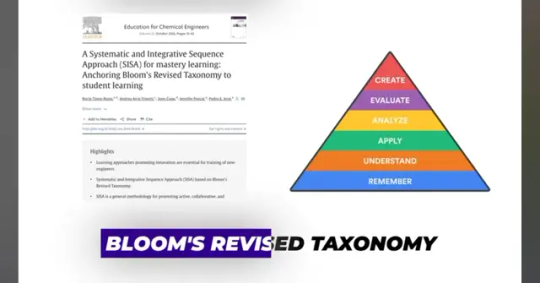
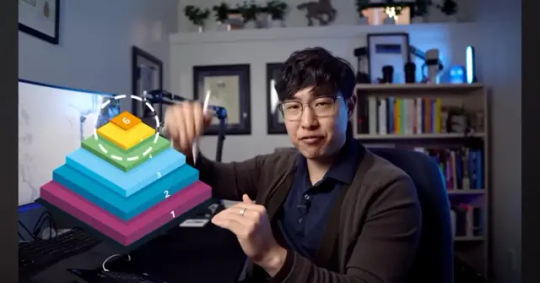

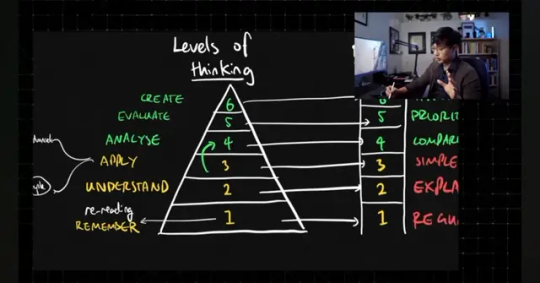
Level 6: Creating
The highest level of learning in Bloom's taxonomy is asking the learner to create something either tangible or conceptual.
This is the highest and most advanced level of Bloom's Taxonomy. Build a model and use it to teach the information to others.
How can you create a model and use it to teach this information to others?
Suitable verbs to ask level 6 questions are:
Create
Generating
Planning
Producing
In the revised taxonomy, knowledge is at the basis of these six cognitive processes, but its authors created a separate taxonomy of the types of knowledge used in cognition:
•Factual Knowledge
Knowledge of terminology
Knowledge of specific details and elements
•Conceptual Knowledge
Knowledge of classifications and categories
Knowledge of principles and generalizations
Knowledge of theories, models, and structures
•Procedural Knowledge
Knowledge of subject-specific skills and algorithms
Knowledge of subject-specific techniques and methods
Knowledge of criteria for determining when to use appropriate procedures
•Metacognitive Knowledge
Strategic Knowledge
Knowledge about cognitive tasks, including appropriate contextual and conditional knowledge
Self-knowledge
#independent artist#musician#producer#hiphop#christian blog#christian music#soundcloud#writer#blooms taxonomy
1 note
·
View note
Text
I want the Cocteau Twins to make more song like Melonella where they sing all the different genus of bacteria
#tumblr#dark academia#words#science#thoughts#stem#scientists#microbiology#cocteau twins#melonella#cocteau twins should be more popular among the biology community#biology#zoology#ecology#taxonomy#conservation#song#genus#cocteau twins song#music#lyrics#science side of tumblr
5 notes
·
View notes
Text
Today > 80's + 90's
Something is off about this categorization...

#maybe they're saying that they deliberately skip playing pop music from the oughts#I would appreciate that#I heard it more than enough during the oughts#time#timeline#taxonomy#twitter#shitpost
7K notes
·
View notes
Text
.
#saw that post that’s like five topics you could talk about for an hour with no prep#y’all can’t talk for an hour unprompted ?#like i could do pokémon: types and advantages-sandstorm types-generational differences-mythologies#music: particular artists-culture on the world stage-historical crossovers and influences#theater: history-shakespeare-expressionism-absurdism#animals: sharks-evolution-general taxonomy#i’m good on any of those for At Least a solid 45 as standalones
0 notes
Text
Musical genres are like taxonomy like sure you can tell the difference between 3rd wave emo and rap but the top comes along and suddenly fish aren't real
1 note
·
View note
Text
A non-exhaustive list of things that are both social constructs and extremely real: language, law, diagnoses, sex (the action), money, color, romance, all taxonomies, the economy, gender, continents, oceans, friendship, family, sex (the body classification), countries, love, crime, music, art.
Many of these things, like color, objectively exist, but we know that they are classified differently by different cultures, so we know that our perception of what colors are the same or different is socially constructed. Others, like sex (the action) and art, have forms that almost everyone agrees count, but as we get into more obscure forms, more and more people disagree on what counts.
994 notes
·
View notes
Text

Name: Googles
Debut: Webkinz
What a cute silly plush duck! Right? WRONG! Goose? INCORRECT! This is no duck. This is no goose. This is no animal we have in our world. This is a Googles, and you have never seen anything like it!
Webkinz, as you likely know, is one of those 2000s Virtual Pet Worlds, with the gimmick of buying a real plush animal that would allow you to play with that animal in the game. And I mean animal! For the most part these are all actual animals, or at least variants of them, like a dog with a watermelon color scheme, or a lion with a flower petal mane. There are also some mythical creatures like dragons, which, yeah, it makes sense. Of course kids would want to have one of those as a virtual pet!
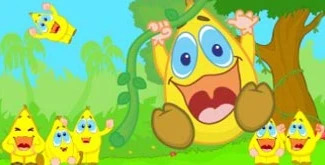
Then there are the Zingoz, original little monster guys who get whacked with bats by bigger monster guys. I guess they're a little weird considering the setting, but "shape with face and limbs" is not on its own Weird. I have no feelings on Zingoz.

It is Googles that fascinates me so much! All of these real animals, some fantasy creatures, a few minor goofy monsters, and yet, there is Googles. They have ducks and geese in the game. This is not one of them. It is the mundanity of Googles that fascinates me so! Of all the things to be an original trademark species, they decided on a Kind Of Different Duck, and I delight in that.
But there IS a reason for Googles! A point of origin! It would have been FUNNIER if there wasn't, but it's ok. It still is nice and makes me smile.
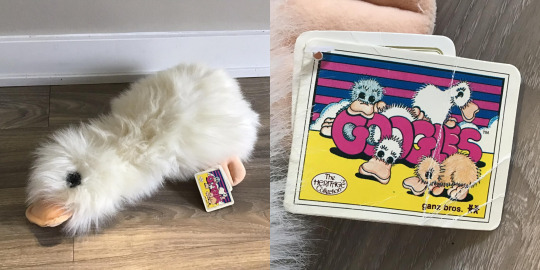
In the 1980s, GANZ, the company that would go on to make Webkinz, released a series of funny little flat plushes, including this ducky one! And that name on the tag... that's Googles! From what I can tell, this whole series was known as Googles, and included other species, like dogs and walruses, but these duck-billed bowling pins were the most popular.
So for Webkinz, they decided to revive one of their old, beloved plush creatures, bringing Googles to new generations while not telling them about its origins, making this silly fowl a strange, mundane mystery! And THAT is all you need to know about the taxonomy of Googles.
youtube
At least, that's what I thought until I found out about this official animated music video for babies, that repeatedly refers to an individual Googles as a PLATYPUS. Platypus?! Where's the TAIL? That's one of the most important features to represent! Their bills certainly are broad, but I assumed it was just a stylization thing. And if platypus, where are their forelegs?
I do not accept this answer. I do not think I will ever find a satisfactory conclusion. I admit defeat, Webkinz Animated Music Video From 2010. You have bested me.
316 notes
·
View notes
Text
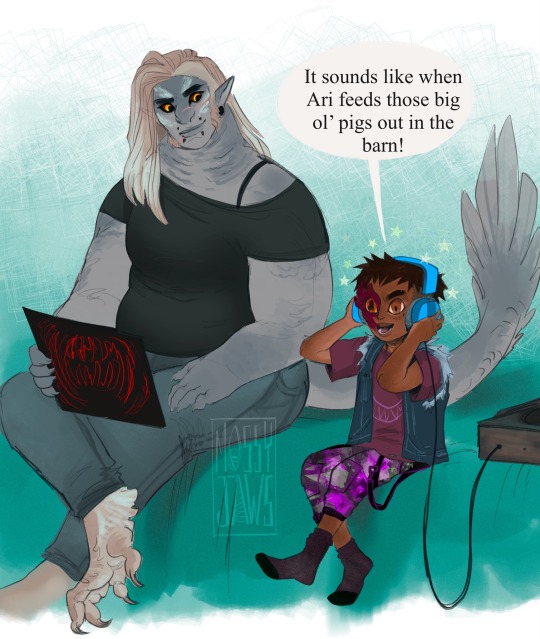




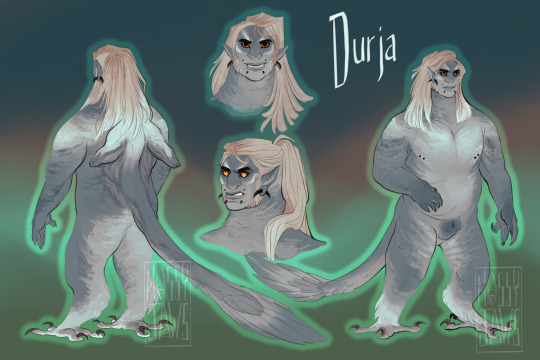
Decided to finally post Durja’s new new look. I feel happy with her now.
I think I already said this but as far as taxonomy goes she’s from the same family(?) as Kraw’s father (who’s also getting a new look); Furies. Her sub species name is ‘Ashen Fury’.
She’s very outdoorsy and knows the lay of Tattered Wing island like the back of her hand. Whenever Gen has to stay behind on the island she’ll often go on what she calls ‘expeditions’ with Durja. Durja’s very strict about staying hydrated and wearing proper clothing though, as well as respecting the albatross griffin’s nesting areas. She likes to drive her old truck around the island as well :]
She often goes to shows with Gastrix and Ari on the mainland, since Gastrix works as a bouncer for a popular bar on the west end of Marrowtide. It often hosts different local metal bands.
She also introduces Gen to a lot of music she likes. She feels it helps Gen with the “excessive energy” she sees her have sometimes.
215 notes
·
View notes
Text
I don't know much about the exotic pet trade in Central Europe in the 1700s, but do you think Mozart ever saw a parrot in real life? Like I believe the nobility and the wealthy high society definitely had an exotic pet phase back then, so it's not implausible that he would've been shown a talking, vocal mimic parrot at some point in his life in the circles he partied and performed in, but can you imagine being that guy and hearing something you composed being sung by a bird? Like I can go on youtube and find a number of videos of different kinds of parrots not just singing, but downright performing, pieces like The Night Queen's aria, but did he ever get to?
Dude died at 35 but definitely had the rockstar-who-died-at-27 vibe all over him. Imagine being that during a time when people were only starting to figure out how things like electricity or flushing toilets work, a century before evolutionary theory was fully fleshed out and idea of animal taxonomy as an exact science was unheard of. And some wine-drunk merchant goes "hey dude I wanna show you something" and shows you a pretty bird that's brightly coloured unlike any that you've ever seen before, a living one that's completely tame and happy to be held on someone's hand.
And the dude goes "but no, wait, it does tricks. Watch this:" and the bird starts to sing like a flute. And not just a tune, but music, a melody. A melody you fucking wrote to show off your sister-in-law's amazing talent and vocal range because you were so impressed by her. And this bird, probably bred in captivity and knowing nothing of its natural environment and how it feels like to be a part of a real flock, whose thought processes are completely alien to you, starts whistling it to you because it, too, knows what music is, and wants to sing to show off how talented it is. Because performing for peoples' glee and delight is the closest thing that this little bird knows to what it feels like to be loved.
554 notes
·
View notes
Text
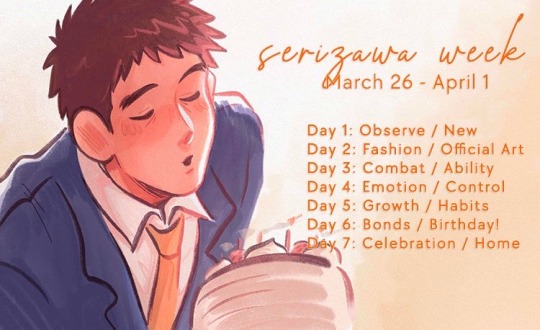
WARNING: FLASHING LIGHTS/PANIC ATTACK(??)
(sound on!! ♫)
Day 4 of #serizawaweek2023 made by @marrymeserizawa !! ☂️ “emotion / control”
music is “Taxonomies” by Larry Gus
617 notes
·
View notes
Text
hmm okay to round up some current disparate tmagp thoughts into one place:
-> the fear taxonomy: I'm not quite sure where I sit on the desires theory currently, but I think it's worth noting that while both of our case subjects from the first episode were explicitly afraid of the spooky things happening to them, none of the rest have been, and I think it's really interesting that tom the horror blogger's whole problem was that he was so desensitized to fear it made him foolhardy (the exact thing our lovely ms georgina barker overcompensated so hard to avoid). yes, you could pick probably any archives statement and try to frame it around a desire instead of a fear because that's how character motivations work, but I don't think it's wrong to point out that since episode two all of our subjects have been remarkably chill about the Horrors happening to them. I'm not totally onboard with the desires at time of writing, I think there a few details that don't quite line up with that idea, but I'm still keeping a pin in the theory.
I also don't think it's wrong to point out that things like "music so hauntingly beautiful it makes a crowd tear itself to bloody pieces" and "paranoia and eye-related gore popping up in conjunction to the magnus institute" are familiar scenarios and seem to match up to the entities as we know them. those are very specific motifs connected to very specific types of Horrors and I think saying it's random coincidence that we're seeing them again is a bit of a weird take.
-> norris, chester, and augustus. in-universe, these voices appeared out of nowhere about a year ago, and one of the central mysteries set up so far is "what the hell is up with all this weird tech?", I think it is a perfectly reasonable assumption to think these voices are part of the mystery and not just an excuse to get jonny and alex's voices in the show. if that were the case, why would there be a third voice? yes, this podcast is meant to be comprehensible to new listeners, but I don't think that rules out any direct ties to archives, I think part of the function of having fresh protagonists who don't know anything about the events of archives is that, if the audience needs to learn anything about the first show, they can learn it along with a viewer-surrogate character.
personally, I think it very unlikely that the voices are literally jon, martin, and jonah's actual consciousnesses trapped in computers, I think those characters' stories are done and there's something funkier happening here (neither them nor not them but a secret third thing, yknow), but dismissing any idea that the voices are related to the characters, again, feels like a weird take.
-> gwen bouchard. honestly I feel like the way the production team have treated gwen's connection to elias vs the way some fans have come at is kind of illustrative. I've seen a couple of groups of fans get weirdly smug about the idea that we don't know gwen is related to elias, her name could just be a red herring, meanwhile on the tmagp post-launch stream everyone there took it as obvious that gwen is a bouchard and thus related to elias. not everything is red herrings, guys. it would be an extremely weird writing move to set up a bunch of stuff with clear links and parallels to archives and have it all be meaningless.
118 notes
·
View notes